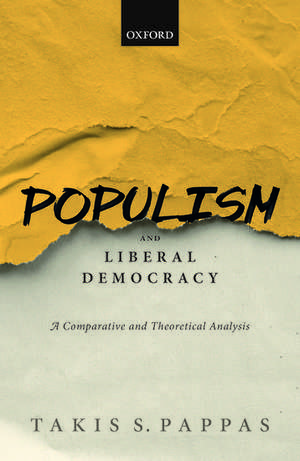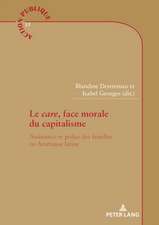Populism and Liberal Democracy: A Comparative and Theoretical Analysis
Autor Takis S. Pappasen Limba Engleză Hardback – 10 apr 2019
Preț: 600.38 lei
Preț vechi: 808.85 lei
-26% Nou
Puncte Express: 901
Preț estimativ în valută:
114.89€ • 118.70$ • 95.57£
114.89€ • 118.70$ • 95.57£
Carte tipărită la comandă
Livrare economică 08-14 martie
Preluare comenzi: 021 569.72.76
Specificații
ISBN-13: 9780198837886
ISBN-10: 0198837887
Pagini: 332
Dimensiuni: 163 x 243 x 24 mm
Greutate: 0.63 kg
Editura: OUP OXFORD
Colecția OUP Oxford
Locul publicării:Oxford, United Kingdom
ISBN-10: 0198837887
Pagini: 332
Dimensiuni: 163 x 243 x 24 mm
Greutate: 0.63 kg
Editura: OUP OXFORD
Colecția OUP Oxford
Locul publicării:Oxford, United Kingdom
Recenzii
The book analyzes basic concepts of populism and the populist phenomenon and mainly tries to connect the theoretical analysis with populist governmental practices...The book analyzes the phenomenon of populism mainly based on the liberalism/antiliberalism distinction. Essentially, it is an attempt to systematize the dominant view, which considers democratically legitimized political majorities dangerous for individual rights, democratic institutions, and economic and political normality.
Pappas's book is certainly an interesting, provocative, and thoughtful contribution to an admittedly overcrowded field, and it deserves wide readership both within and outside populism studies.
Takis Pappas offers a new lens to examine populism within the context of democratic governance. He uses extensive examples to demonstrate its roles inside the bounds of democracy and its temptations to evolve into authoritarianism. But his biggest contribution is the recognition of populist governance as a form of democratic governance. Others have made this point, but Pappas has constructed a larger framework to make his point. He goes in-depth into multiple examples including anunparalleled examination of Greek populism. And ties these examples back to his larger conceptual framework in the end.
How do you know populism when you see it? In this ground-breaking book, Takis Pappas uses logic and the principles of political theory to develop a clear-cut set of empirical guidelines through which to assess populism and the dangers it poses to liberal democracy. Covering not only the politics of populists, through their direct appeals to 'the people', charismatic leadership, and symbolic politics, but also their policies in different institutional settings, this remarkable book stands out for its sweeping discussion of the causes and consequences of populism in power in Europe and the Americas.
The subject of populism is now at the center of public concern in countries around the world, but scholarship on the subject is only beginning to catch up. Takis Pappas was one of the first social scientists to make a systematic effort to identify the essential characteristics of present-day populism and to distinguish it from related phenomena, a task he has carried out in a highly original and generally persuasive manner. His new book, which treats populism as synonymous with democratic illiberalism, demonstrates that he remains at the forefront of scholarship in this field. It will also be of interest to anyone concerned with the broader question of the relationship between liberalism and democracy.
This book provides both scholars and practitioners with thoughtful critiques, exacting typologies, and wide-ranging analyses of populism as democratic illiberalism. At the heart of populism's growing appeal are the growing anxieties of the middle class that they are about to lose their hard-won gains-and the leaders who successfully exploit these fears.
It is not easy to write something original and important about populism these days but this is exactly what Takis Pappas has done.
Takis Pappas offers a taut and incisive view of populism, pared down to democratic illiberalism. In a sharp and vigorous analysis, he argues for the separation of what is necessary for understanding populism from what is frequently miscategorized. Pappas unpacking of the notion of the people is a particularly valuable instance of his impressive capacity for conceptual distinctions and disaggregation. The result is an analytically trenchant interrogation of the ideas, practices, leadership styles and recent comparative histories of populism that will stimulate considerable debate among its students and claim a noteworthy place on the populism bookshelf.
In this interesting and important contribution to a crucial debate, Takis Pappas highlights through an impressively wide-ranging theoretical discussion the inherent threat that populism poses to liberal democracy. Then he demonstrates through an extensive investigation of crucial cases under what conditions populist leaders can achieve their nefarious goals. The conclusion is that liberal democracy faces a serious challenge, but is not defenseless.
Pappas's book is certainly an interesting, provocative, and thoughtful contribution to an admittedly overcrowded field, and it deserves wide readership both within and outside populism studies.
Takis Pappas offers a new lens to examine populism within the context of democratic governance. He uses extensive examples to demonstrate its roles inside the bounds of democracy and its temptations to evolve into authoritarianism. But his biggest contribution is the recognition of populist governance as a form of democratic governance. Others have made this point, but Pappas has constructed a larger framework to make his point. He goes in-depth into multiple examples including anunparalleled examination of Greek populism. And ties these examples back to his larger conceptual framework in the end.
How do you know populism when you see it? In this ground-breaking book, Takis Pappas uses logic and the principles of political theory to develop a clear-cut set of empirical guidelines through which to assess populism and the dangers it poses to liberal democracy. Covering not only the politics of populists, through their direct appeals to 'the people', charismatic leadership, and symbolic politics, but also their policies in different institutional settings, this remarkable book stands out for its sweeping discussion of the causes and consequences of populism in power in Europe and the Americas.
The subject of populism is now at the center of public concern in countries around the world, but scholarship on the subject is only beginning to catch up. Takis Pappas was one of the first social scientists to make a systematic effort to identify the essential characteristics of present-day populism and to distinguish it from related phenomena, a task he has carried out in a highly original and generally persuasive manner. His new book, which treats populism as synonymous with democratic illiberalism, demonstrates that he remains at the forefront of scholarship in this field. It will also be of interest to anyone concerned with the broader question of the relationship between liberalism and democracy.
This book provides both scholars and practitioners with thoughtful critiques, exacting typologies, and wide-ranging analyses of populism as democratic illiberalism. At the heart of populism's growing appeal are the growing anxieties of the middle class that they are about to lose their hard-won gains-and the leaders who successfully exploit these fears.
It is not easy to write something original and important about populism these days but this is exactly what Takis Pappas has done.
Takis Pappas offers a taut and incisive view of populism, pared down to democratic illiberalism. In a sharp and vigorous analysis, he argues for the separation of what is necessary for understanding populism from what is frequently miscategorized. Pappas unpacking of the notion of the people is a particularly valuable instance of his impressive capacity for conceptual distinctions and disaggregation. The result is an analytically trenchant interrogation of the ideas, practices, leadership styles and recent comparative histories of populism that will stimulate considerable debate among its students and claim a noteworthy place on the populism bookshelf.
In this interesting and important contribution to a crucial debate, Takis Pappas highlights through an impressively wide-ranging theoretical discussion the inherent threat that populism poses to liberal democracy. Then he demonstrates through an extensive investigation of crucial cases under what conditions populist leaders can achieve their nefarious goals. The conclusion is that liberal democracy faces a serious challenge, but is not defenseless.
Notă biografică
Takis S. Pappas has a PhD from Yale University and is a comparative political science researcher and writer affiliated with the University of Helsinki, Finland. He is the author of Making Party Democracy in Greece (Macmillan,1999),Populism and Crisis Politics in Greece (Palgrave, 2014), and the co-editor of European Populism in the Shadow of the Great Recession (ECPR, 2015).























